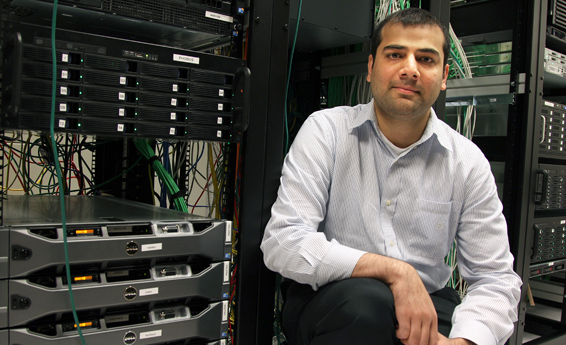EKG data mined to predict heart attack fatalities

 Enlarge
Enlarge
Assistant Professor Zeeshan Syed, along with researchers from MIT, Harvard Medical School, and Brigham and Women’s Hospital in Boston have used data-mining techniques to identify subtle, previously unknown markers of heart damage in the EKG records of patients who have recently suffered heart attacks. These markers could help doctors to identify which heart attack patients are at high risk of sudden cardiac death. The researchers’ findings will be published in the paper, “Computationally Generated Cardiac Biomarkers for Risk Stratification After Acute Coronary Syndrome,” in the Sept. 28, 2011 edition of Science Translational Medicine.
Approximately one million Americans suffer a heart attack each year. In certain age groups, more than a quarter of those who survive the initial attack end up dying of complications within a year, according to the American Heart Association. The researchers’ findings could help match tens of thousands of cardiac patients at risk for post heart attack death with life-saving treatment.
During the months after a heart attack, patients are particularly vulnerable to sudden death due to irregular heart rhythms. These could be prevented with medication or implantable defibrillators, which can shock the heart back into rhythm. Right now, it’s difficult to determine who needs them before it’s too late. A majority of patients who have implantable defibrillators never end up needing them. And a majority of people who die of sudden cardiac arrest were not shown to be candidates for a defibrillator using today’s tests.
“Today’s methods for determining which heart attack victims need the most aggressive treatments can identify some groups of patients at a high risk of complications. But they miss most of the deaths — up to 70 percent of them,” said Prof. Syed.
Using data mining and machine learning techniques, the researchers analyzed 24-hour continuous electrocardiograms (EKGs or ECGs) from 4,557 heart attack patients enrolled in a large clinical trial led by the Brigham and Women’s Hospital/Harvard Medical School TIMI Study Group, one of the world’s leading cardiovascular research organizations. The researchers found that the EKG signals from many of the patients who later suffered cardiovascular death contained similar errant patterns that until now were dismissed as noise or were simply undetectable.
Syed and his colleagues developed new ways to parse through the data to find the abnormalities — “computational biomarkers” that point to defects in the heart muscle and nervous system that evolve over time. The biomarkers are termed morphologic variability, heart rate motifs and symbolic mismatch.
Morphologic variability is the amount of subtle variability in the shape of apparently normal-looking heartbeats over long periods of time. Heart rate motifs refer to specific sequences of changes in heart rate that reflect whether the heart is responding to nervous system signals as it should. And symbolic mismatch measures how different a patient’s long-term EKG signal is compared with those of other patients with similar clinical histories.
This research was funded by the National Science Foundation, the Center for Integration of Medicine and Innovative Technology, Quanta Computer, and the Harvard-MIT Division of Health Sciences and Technology. The paper is titled “Computationally Generated Cardiac Biomarkers for Risk Stratification After Acute Coronary Syndrome.” Ongoing research is supported by the American Heart Association.
Prof. Syed is affiliated with the Artificial Intelligence Laboratory, the Center for Computational Medicine and Bioinformatics, the Center for Global Health, and the Depression Center at the University of Michigan. He is also affiliated with the Center for Health Services Research at the Henry Ford Hospital, and the Data-Driven Medicine Group at MIT. He has taught courses in Data Structures and Algorithms (EECS 281), Biomedical Machine Learning (EECS 598), and Computation for Predictive and Personalized Medicine (EECS 598).
Read More:
An SOS from a failing heart: Saving heart attack patients with computer science (College of Engineering)
 MENU
MENU